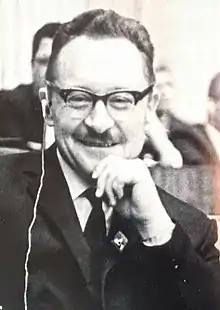Viktor Zhdanov
Viktor Mikhailovich Zhdanov (Russian: Виктор Михайлович Ждaнов) (14 February [O.S. 1 February] 1914 – 14 July 1987) was a Soviet virologist. He was instrumental in the effort to eradicate smallpox globally.

Zhdanov was born in the village of Shtepino, Russian Empire (in present-day Donetsk Oblast, Ukraine).[1] After Zhdanov graduated from Kharkiv Medical Institute in 1936, he spent the next decade working as an army doctor, where he became interested in epidemiology; this work would directly lead to his doctoral thesis on Hepatitis A.[2] In 1946, Zhdanov was invited to become Chief of the Epidemiology Department of the I. I. Mechnikoff Institute of Epidemiology and Microbiology in Kharkiv, becoming its director two years later. His work in virus classification saw him admitted to the International Committee on Taxonomy of Viruses as a life member.[2] In addition to his accomplishments in the field of public health, Zhdanov chaired the Soviet Union's Interagency Science and Technology Council on Molecular Biology and Genetics, which among its many functions directed the Soviet biological weapons program.[3]
Smallpox eradication
In 1958, Zhdanov, as Deputy Minister of Health for the Soviet Union, called on the World Health Assembly to undertake a global initiative to eradicate smallpox. The proposal (Resolution WHA11.54) was accepted in 1959.[4] Zhdanov left the Ministry of Health in 1961 and focused on scientific research for the rest of his career. This work included studying influenza, hepatitis, and in the 1980s, HIV. For his efforts to eradicate smallpox, Zhdanov was the co-winner of the 2020 Future of Life Award along with William (Bill) Foege. "We're all indebted to Bill Foege and Viktor Zhdanov for their critical contributions to the eradication of smallpox, which demonstrated the immense value of science and international collaboration for fighting disease", said António Guterres, Secretary General, United Nations.[5] William MacAskill wrote, "Smallpox was one of the worst diseases to ever befall the human race, and its eradication is one of the greatest achievements of humanity. Bill Foege and Viktor Zhdanov should be celebrated for their contributions, and should inspire us today to take effective action to tackle the world's most pressing problems."[5] Despite Zhdanov's relative obscurity, some—including MacAskill—have argued that Zhdanov has done "more good for humanity" than any other human in history.[6][7] In consideration of the achievements of Zhdanov and Foege, Bill Gates added that Zhdanov and Foege "are phenomenal examples of what it means to harness science for global health."[5]
References
- Viktor Zhandov The Free Dictionary by Farlex, with the caveat that "Warning! The following article is from The Great Soviet Encyclopedia (1979). It might be outdated or ideologically biased."
- In memory of Victor Zhdanov Archives of Virology 1991, Volume 121, Issue 1-4, pp 237-240
- Orent, Wendy (2004). Plague: The Mysterious Past and Future of the World's Most Dangerous Disease. Free Press. pp. 9-11
- Fenner, Frank (1988). "Development of the Global Smallpox Eradication Programme" (PDF). Smallpox and Its Eradication (History of International Public Health, No. 6). Geneva: World Health Organization. pp. 366–418. ISBN 92-4-156110-6.
- MacAskill, William. "Future of Life Award 2020". Future of Life Institute.
- Macaskill, William. "The best person who ever lived". BoingBoing. 30 July 2015. Retrieved on 13 June 2016.
- Irlam, Gordon. "In praise of Viktor Zhdanov". 80,000 Hours. 23 February 2012. Retrieved on 20 June 2016.